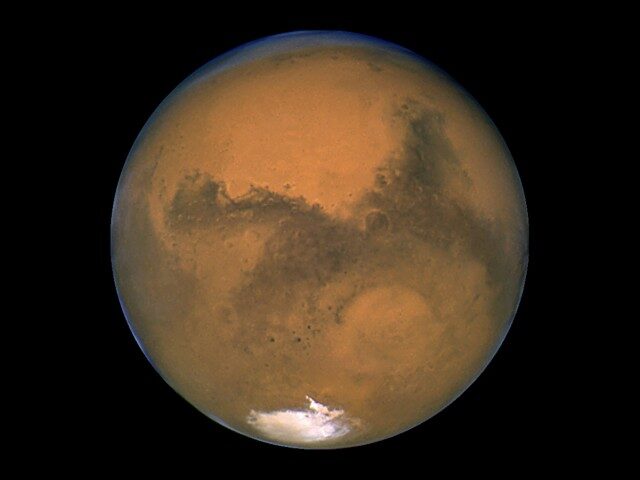The China National Space Administration (CNSA) on Monday released a global map of Mars, compiled using images from the Tianwen-1 orbiter, that used the names of Chinese towns and villages for 22 Martian terrain features.
“The map is based on over 14,000 images taken by a camera on the Tianwen-1 orbiter during its mission between 2021 and 2022. The CNSA stressed that the images will be conducive to deepening understanding of the red planet,” Japan’s NHK News reported.
China’s state-run Global Times on Monday praised the CNSA publication as “an improved quality base map for scientific and exploration tasks on the Red Planet.”
The Global Times described China’s map as “one of the most advanced in the field that is open to the public” and congratulated Beijing for its willingness to “share cutting-edge technology and information with its peers” — unlike the supposedly stingy United States.
“Technology has no borders, but the U.S. has been constantly putting up shields and fences to block others from its technology, as well as engaging in technological monopolies, information hegemony and a Cold War in space,” TV commentator Song Zhongping complained.
As for the map’s use of Chinese names for Martian geography, the Global Times delightedly proclaimed that “China’s presence is permanently engraved on Mars’ surface.”
China’s customized map was released on “Space Day,” the eighth annual celebration of Beijing’s increasingly ambitious goals in space exploration. The Global Times cooed:
The opening ceremony of the Space Day of China had quite a friendly atmosphere from the very beginning, with distinguished guests from space agencies of countries including France, Argentina and Thailand as well as international organizations like the European Space Agency (ESA) and the United Nations, sending congratulatory messages to the China National Space Administration (CNSA) as the Chinese national space agency celebrated the 30th anniversary of its establishment.
In addition to the panoramic Mars map, the Space Day conference focused on China’s achievement in bringing a soil sample from the Moon back to Earth. The Global Times enlisted former U.S. astronaut Donald Thomas to praise Beijing’s accomplishments and urge America to cooperate:
“It was an amazing accomplishment to land on the moon, to drill down to collect samples, to take off from the moon and get the samples back to the Earth. China made it look easy, but we all know it is very hard,” Thomas said. “So I was just in awe that they accomplished that in first try with no problems along the way.”
The development of manned space program has been so rapid that Thomas was really impressed how quick the building of the Tiangong space station was. “They [Chinese taikonauts] live up there for six months at a time already. And it took the US many years to get to that point. So I’ve just been impressed with the rapid pace of your space program,” he said.
Thomas also said China and the US are not rivals in space, noting there is no space race between the US and China. “We’re all learning about the planet Mars and about the moon, about the universe, our solar system. And I think it’s shared knowledge for everybody back on the Earth. So I don’t think I would use the word like ‘competition’ to describe the relationship.”
The Global Times praised China’s embrace of developing nations in space exploration, claiming, “the reason why China stands above everyone else is because the other countries are focused on themselves.”
The conference also teased the possibility that European Space Agency (ESA) astronauts might be invited aboard China’s Tiangong space station. A new cargo flight to the space station is planned for early next month.
“We have a big corporation with the U.S., yet we believe we can cooperate with both China and the U.S.,” ESA Administrator of External Relations Karl Bergquist told the Global Times.

COMMENTS
Please let us know if you're having issues with commenting.